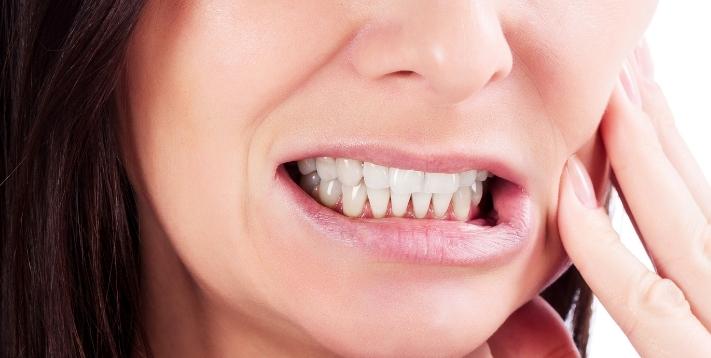Bruxism (teeth problems)
Do you suffer from cheek pain or teeth sensitivity on waking up in the morning? It occurs due to frequent clenching or grinding of teeth.
Clicking, popping your jaw points, grating sounds, uncontrollable jaw, and tongue movements as well as pain in the cheek muscles are some conditions that should not be neglected. Those who clench/grind their teeth while awake, suffer from awake bruxism, whereas those who experience it at night, suffer from night bruxism. Mild cases may not require treatment immediately, however, persistent, and severe bruxism can lead to jaw and teeth problems over time.
What are the causes?
Bruxism is a type of Temporomandibular Disorder. There is no root cause of bruxism. It is believed to occur due to a combination of factors. These may include habits (like pencil, cheek, or nail-biting), psychological factors (anxiety, depression, and stress), temporomandibular (TMJ) disorders, myofascial pain syndrome and sleep disorders (e.g., sleep apnea).
People who suffer from bruxism may experience one or more of the following symptoms:
- Tooth grinding noticed by the partner during sleeping (night bruxism cases)
- Waking up with clenched teeth
- Teeth and gum pain or sensitivity
- Orofacial pain
- Jaw point or Jaw muscle pain
- Fascial muscle pain that may radiate to the jaw or neck
- Tooth wear (flattened or chipped teeth), shaky or fractured teeth
- Jaw problems (TMJ disorder)
- Clicking sounds of joints
- Headaches
- Sleep disturbances
The symptoms of bruxism may be confused with other problems. Hence one can visit a dentist to correctly identify and get them treated.
A TMD (Temporomandibular Disorder) specialist can bring relief in these conditions.
- Dental splints and mouth guards: These oral appliances reduce the heavy biting forces that cause tooth wear-n-tear. This is particularly helpful in night bruxism as they reduce the chances of loss of teeth and gum support in extreme situations.
- Dental restorative treatments like tooth crowns and dental implants help correct any bite problems that may aggravate bruxism.
- TAlignment of teeth using braces can help provide the support needed to bear the unnecessary biting forces that occur while grinding teeth in the long run.
- In certain cases, bruxism may affect the gums and weaken the support of the teeth causing shaky teeth and eventually tooth loss. Dentists identify these areas and perform the necessary dental procedures to prevent such scenarios.
- Medicines like muscle relaxants can be prescribed to reduce the pain of the facial muscles due to bruxism if present.
- Advanced treatment like Botox injections, biofeedback procedures, low-level electrical stimulation of the facial muscles etc. may also be available to address any other issues. Your dentist will be able to provide you with the best option suited to you, depending on the severity of your bruxism.
Consulting a sleep specialist may be suggested to address any underlying cause like sleep apnea.
It is advised to visit the dentist who is a TMD specialist as soon as you notice any bruxism symptoms to avoid harsh potential gum and teeth problems as well as jaw disorders (i.e., TMJ syndrome).
At Ivory Dental Clinic, we offer treatments on TMD through our trained specialists. Our dental clinic is one of the best dental clinics in Navi Mumbai. Connect with us to know more about your TMD, and we can guide you through the recovery process.


